Fellow Travelers’ writer on Jonathan Bailey and Matt Bomer, sex scenes, and Philadelphia
Exclusive: Ron Nyswaner tells Attitude he can't imagine anyone else other than Bailey and Bomer in the lead roles
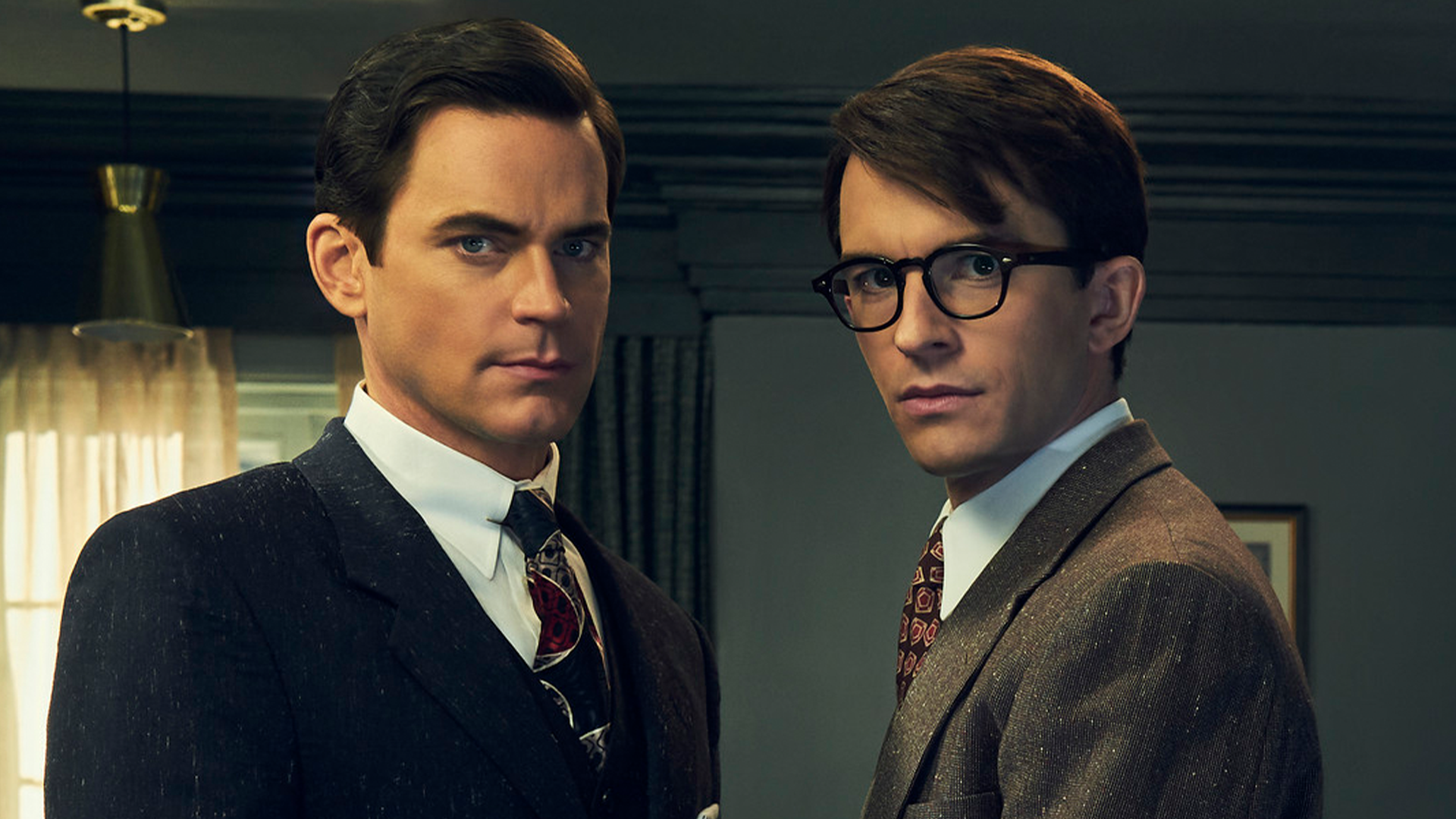
“I think we did pretty darn well,” summarises Ron Nyswaner. I’ve asked the writer of Showtime’s Fellow Travelers if he’s read any of the reviews ahead of the show’s release. But he doesn’t read reviews “unless they’re good.” With most speaking in glowing terms of the LGBTQ+ drama surely he’s read some? He hasn’t, but as is the way of the world in 2023, word gets through no matter what so he does have some idea of how his work over the last four or five years is going down with audiences.
Having seen the finished show himself, he’s thankful to all his collaborators. “It really fills me with a lot of gratitude,” he smiles, his sense of relief detectable even over Zoom.
Fellow Travelers, set to premiere on Paramount+ in the UK on 28 October and in the US on Showtime today (27 October), follows the story of two lovers, Hawkins ‘Hawk’ Fuller and Tim Laughlin (Matt Bomer and Jonathan Bailey respectively) from the Lavender Scare of the 1950s and McCarthy-era America to the Aids crisis of the 1980s.
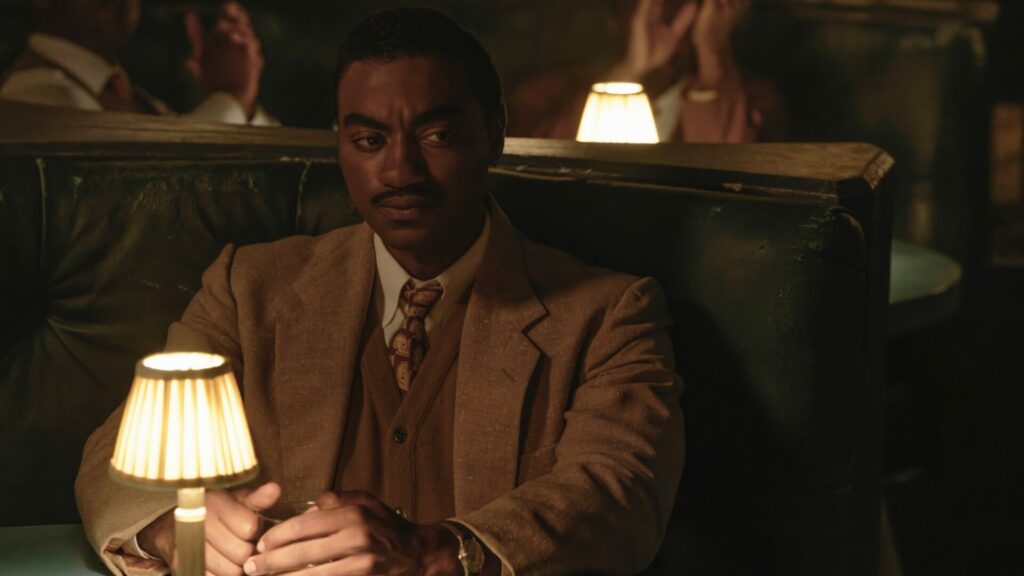
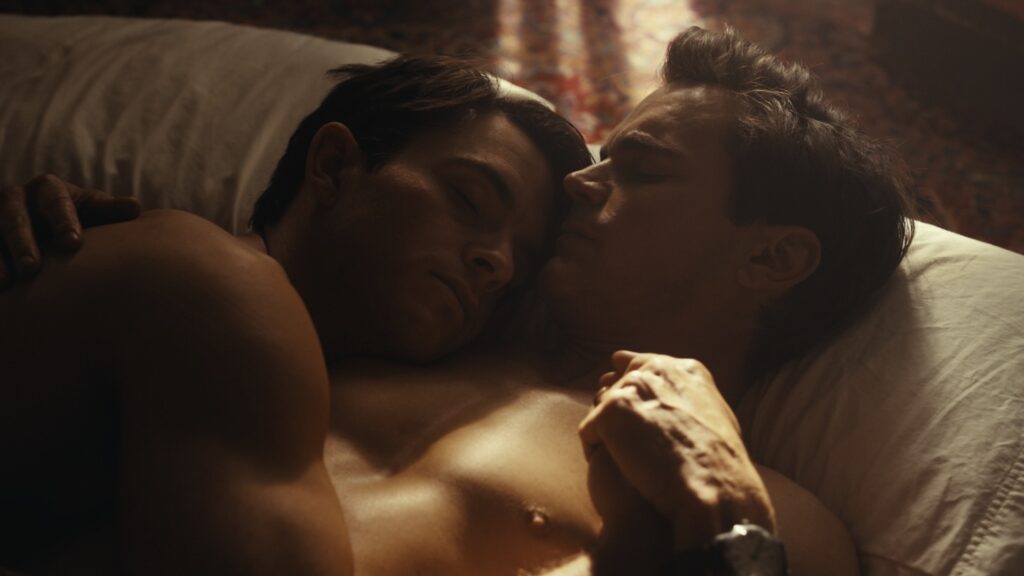
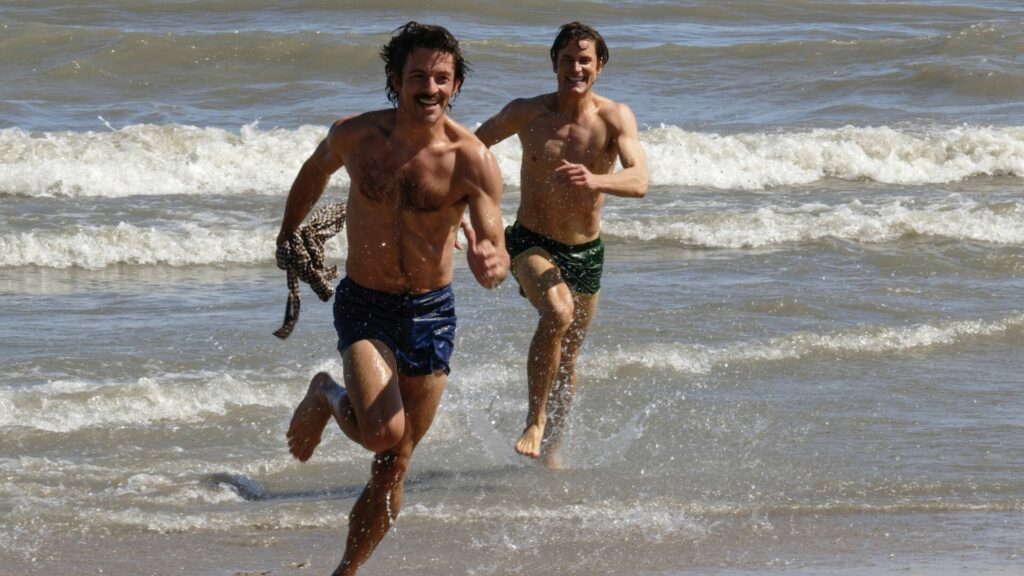
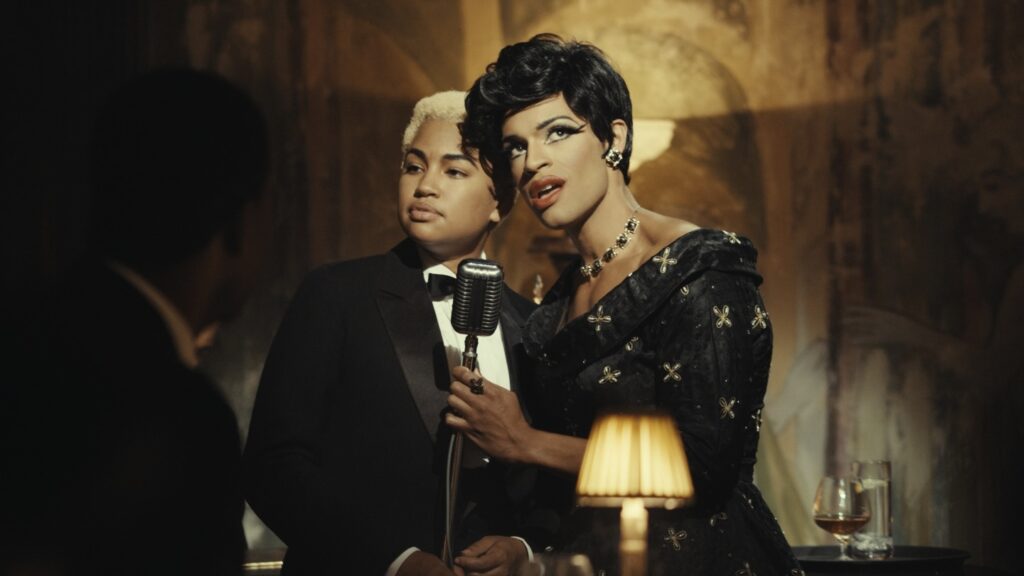
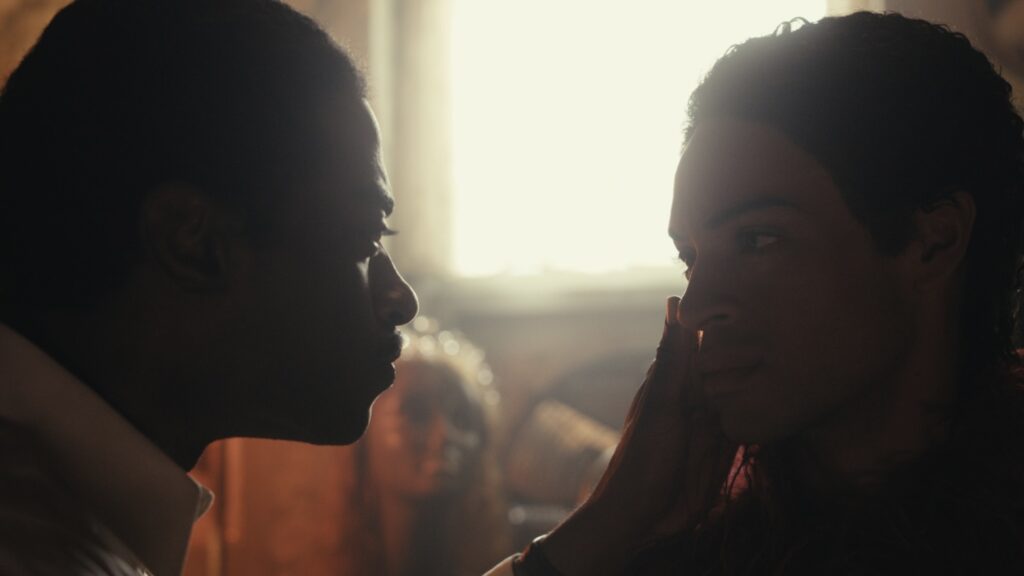
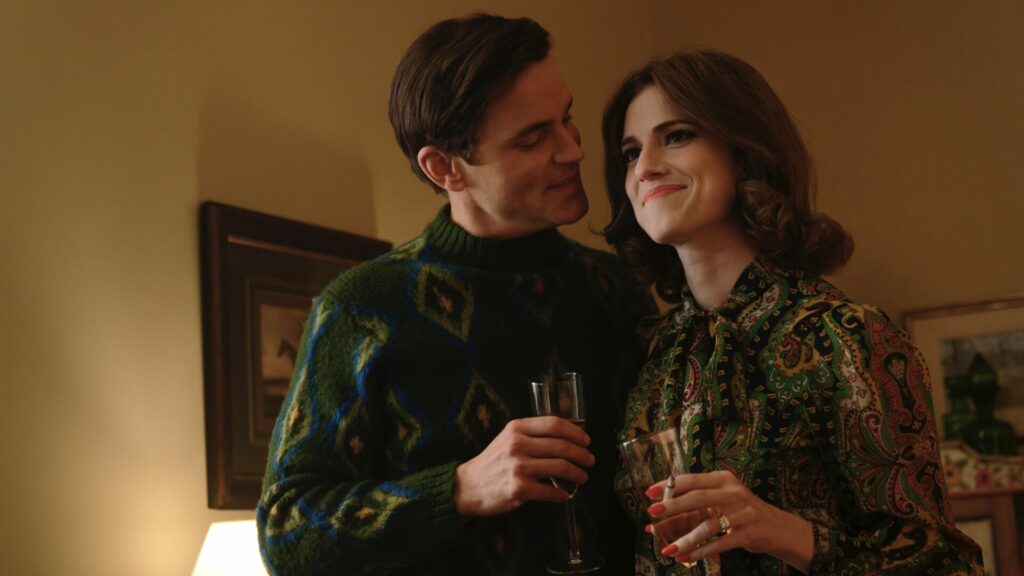
Both men must navigate their relationship with one another against the backdrop of America’s turbulent political history. The series is part gay romance drama part political thriller. Hawkins and Tim can’t resist one another, which results in some passionate sex scenes, but they also spend much of the series having to tread carefully to avoid suspicion and escape persecution. They are also very different people, something which drew Nyswaner to the story in the first place.
“I love a love story that’s about a couple that really aren’t destined to be together. They don’t see the world the same way, they go through life with very different attitudes and values. And yet they’re powerfully drawn to each other. And I think each kind of needs something that the other one has, but they aren’t quite ready to accept that.”
Nyswaner first optioned the series 11 years ago proving the age-old adage: good things come to those who wait. Nyswaner had to make a living, and spent time working on two US series, Ray Donovan and Homeland, both of which have had an influence on Fellow Travelers. Notes of the former can be found in the character of Hawkins, although Nyswaner also says that “Hawkins’s character is pretty fully formed in the novel.” And the latter series helped inspire the political thriller nature of Fellow Travelers.
“We wanted to move through time kind of adventurously” – Fellow Travelers‘ Ron Nyswaner
One major departure from Thomas Mallon’s novel of the same name on which the series is based is the expansion from the ’50s setting into the ’60s, ’70s, and ’80s. Part of the reason for this was a perhaps selfish desire on Nyswaner’s part who “didn’t want to give them [Hawkins and Tim] up that quickly.” He wanted to see the two love and fight over a period of 35 years or so.
The series begins in 1986. We open on a lavish garden party hosted by an older Hawkins and wife Lucy (played brilliantly throughout by Allison Williams). The arrival of Marcus (Jelani Alladin) informs us that Tim, now in San Francisco, is ill and not doing well. The series then spends much of its duration flashing back and forth between the characters’ present in the ’80s, and their parts, starting in the ’50s.
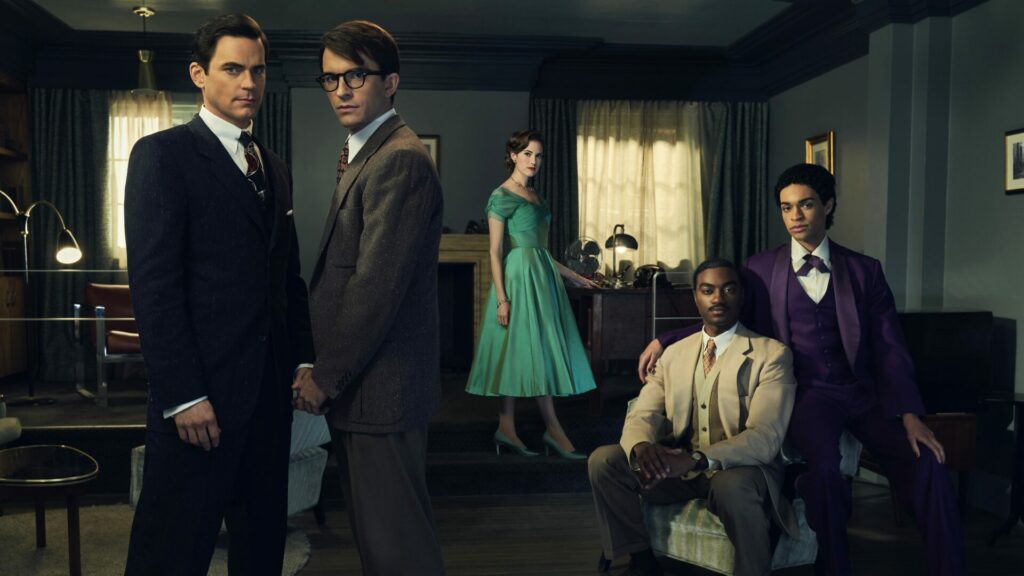
This has been picked on in some reviews as giving too much away too soon. We know where the characters end up. However, for Nyswaner, it raises the stakes, it provides mystery. He wants his audience to question how the characters got here. What’s happened along the way? And the journey is a feast to behold. Spectacularly shot, acted, and designed, it’s a lavish series harkening back to the days of prestige television.
As well as a desire to spend more time with Hawkins and Tim, Nyswaner also wanted to see them in the Aids crisis, a pivotal time in LGBTQ history as well as Nyswaner’s life personally. Like many, he had personal losses at this time. It also informed another pivotal moment in his life, 1993’s Philadelphia which Nyswaner also wrote. So of course he had to tell the story in between. “We wanted to move through time kind of adventurously,” he continues admitting the time jumping came with its challenges when it came to filming. The results speak for themselves.
“I have no interest in likable characters” – Fellow Travelers‘ Ron Nyswaner
Turning to the characters that caught Nyswaner’s attention, the writer gives his take on the two men. Hawkins, a former army man turned political tactician is a cool and suave figure and master of disguise. Enjoying multiple meaningless trysts with men around Washington DC he appears the very picture of respectability to the Washington elite. At times he comes across as cold and uncaring, sacrificing other people to protect himself and those he cares about. In reviews, he’s been compared to the likes of Mad Men‘s Don Draper. In my review, I included the US Queer As Folk‘s Brian Kinney, who seems to have a similar heart of gold but doesn’t always present himself as the most caring. It’s largely an assessment that Nyswaner agrees with.
“Hawkins Fuller is not empty inside. He actually has a very rich inner life, which he keeps to himself except every now and then some of it comes out. Tim gives himself to Hawk physically in very powerful, sometimes painful ways. And every now and then the door opens a little bit and Hawk shows a little bit of his inner life.” A tender moment from the series’ first episode proves this point the writer argues. “That’s what separates Hawk from those other anti-heroes. Hawk has the ability to love. He just doesn’t employ it very often.”
My next question was about whether Nyswaner considers Hawkins a hero in any regard, so his use of the anti-hero descriptor is somewhat revealing. Some of Hawkins’ actions will have audiences seriously questioning his morality. This is driven by the political context in which we see him but that doesn’t necessarily justify his actions. Nyswaner isn’t remotely concerned. “I have no interest in likable characters. If somebody says ‘Let’s make this character likable’, I say I need to move on. This is not the job for me.” And having seen Fellow Travelers with audiences, many of whom love Hawkins, the series’ creator is assured the character is engaging.
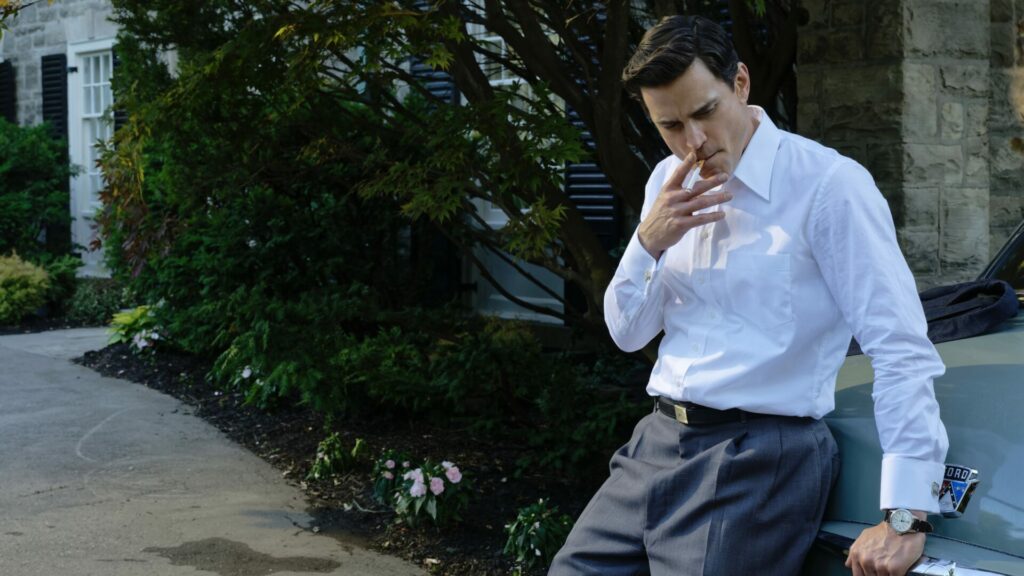
Nyswaner relays a conversation he had with Destiny Ekaragha, one of the series’ directors, about why she, a 40-year-old Nigerian woman living in London, wanted to be involved in the show. Was it the themes of racism and homophobia that the show tackles? No. “She said, ‘I want to be Hawkins Fuller. I want to be beautiful, have as much sex as I can have, and not care about anything.’ I think people really enjoy somebody who goes through life getting what they want,” Nyswaner says with a wry smile.
When I enquire whether Nyswaner has thought about what happened in Hawkins’ life to make him the way he is I’m politely shut down. “I don’t really get into people’s trauma and stuff like that. I think that’s for social workers. I’m a dramatist.”
“I definitely would be chasing Hawkins for the next 35 years” – Fellow Travelers‘ Ron Nyswaner
Moving onto the character of Tim I pick up on Nyswaner’s earlier comment about “likable” characters. Certainly, at the outset of the series, Tim is the epitome of likable. He’s kind, caring, and gentle. This evokes a slight retraction from Nyswaner, who clarifies “I sometimes speak in hyperbole to make a point. What I don’t like is characters whose edges are smoothed out because people are afraid if they are too much of one thing or the other, the widest audience possible won’t like them. Nobody wants to watch nice people. It’s so boring.”
What interests Nyswaner about Tim is his internal struggle between his faith as a Roman Catholic and his sexuality. “His powerful attraction to Hawkins, which he knows is probably going to cause more pain than not. But being with him is worth it. Sometimes love, you can’t control it. And we don’t necessarily always make healthy choices when we’re driven by passion. And Tim is very passionate. He’s passionate for God, he’s passionate for Hawkins Fuller.
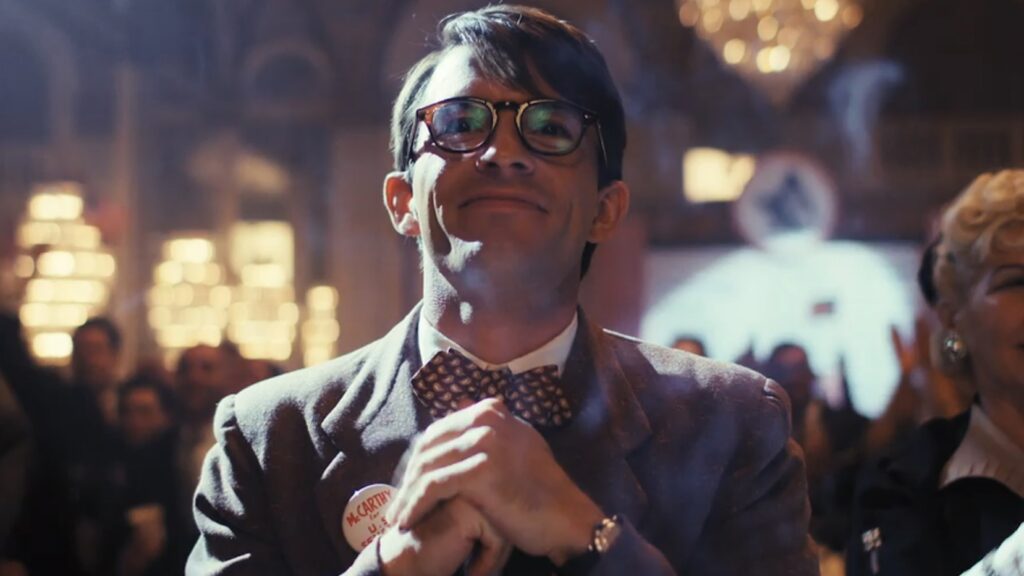
Is Tim the character Nyswaner most identifies with? The Fellow Travelers creator goes for half Tim half Hawkins, a nice and intriguing balance. It yields another anecdote from the set: a game of which character would you fall in love with? “It says something about how people answer that question. I definitely would be chasing Hawkins for the next 35 years if he walked into my life without a doubt,” Nyswaner admits freely.
The series has many good things to speak of, but at its heart is the relationship between Hawkins and Tim, played commandingly by Matt Bomer and Jonathan Bailey, whose chemistry is evident and shines throughout. “No, I can’t,” is Nyswaner’s short but sweet answer to whether he could imagine anyone else in the roles. “You always want to see actors together when the relationship is at the center. We did a chemistry read except Matt was in LA and Jonny was in London. They were on Zoom pretending to be sitting next to each other on a park bench and even with thousands of miles between them within minutes we knew we have to see these two guys together. And Matt and Jonny liked each other immediately and that really, I think, helped our show.”
“I don’t take stands about what other people do, I just take a stance about what I do” – Fellow Travelers‘ Ron Nyswaner
Having queer actors in queer roles (as well as Bailey and Bomer, Jelani Alladin and Noah J. Ricketts, who plays Frankie both identify as LGBTQ too) definitely boosted the series’ authenticity, demonstrating the power of accurate representation. The actors queer identities meant there was a “shorthand” when it came to understanding queer desire. “Just understanding what it’s like to desire another man and how you might hide that desire,” Nyswaner goes on to say. “Even today, we still have to sometimes be careful about expressing our desire for other people. So they understood that.”
Naturally, we move on to discuss the ongoing debate about who should get to play queer roles. Many have weighed in, offering both simple and nuanced points of view on the subject. Nyswaner confidently offers a simplistic viewpoint. “I don’t take stands about what other people do, I just take a stance about what I do. I love writing LGBTQ characters. I’ve done it a lot. I hope to keep doing more of it. I will look for LGBTQ actors to play those roles.”
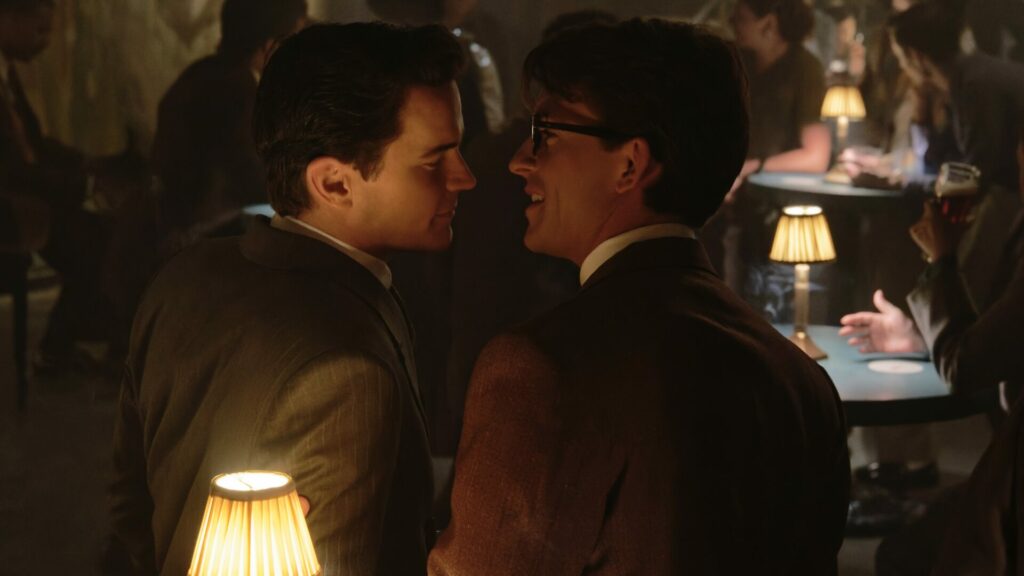
The series’ creators never intended to cast only queer actors in queer roles, it was a fortunate happenstance. And given his viewpoint, I pry for his thoughts on Tom Hanks’ comments earlier this year that if Philadelphia was being filmed now he wouldn’t take the role. He finds the hypothetical idea of making the film today “irrelevant” as “we’re not.” Otherwise, he stands by the reaction the film had at the time and continues to, particularly Hanks’ portrayal. More on that shortly.
“You wouldn’t repeat the same dialogue. So why repeat the same sex?” – Fellow Travelers‘ Ron Nyswaner
If you haven’t seen any promotional material for Fellow Travelers, you’ll have missed the snapshots of some steamy-looking sex scenes. Well, they’re more than steamy and there are more than a few of them too. These were treated like every other scene, they had to move the plot forward. Each is a delicate “exchange of power,” Nyswaner explains which the actors enjoyed as it elevated the sex scenes, which also conformed to all the rules when it comes to intimacy coordinators and closed sets. “The sex scenes are in the script and our actors came so thoroughly committed to the scripts, and to giving the show what it needed, that it wasn’t a particularly challenging part of making the show,” says Nyswaner.
The challenge with the sex scenes was making each one different. As Nyswaner reasons, “You wouldn’t repeat the same dialogue. So why repeat the same sex? And if you think about it, there are lots of combinations.” So, no acts are repeated, in the same way at least. Roles are changed or threesomes had, each signifying a change in power dynamics or a development in a pair’s relationship. “By the time we got to episode eight, we were scratching our heads, thinking what orifice haven’t we used in what way?” Nyswaner chuckles.
“It changed my life” – Ron Nyswaner on Philadelphia
As our conversation draws to a close we go back to Philadelphia. This year marks 30 years since the film premiered on the silver screen, becoming a mainstream commercial success starring two hot-ticket actors in leading roles, Tom Hanks and Denzel Washington. It brought the topic of Aids and HIV to people who needed to be introduced to those topics properly, beyond the communities being ravaged by them at the time.
Looking back on it, Nyswaner remembers it as a “life-changing experience.” Continuing, he says, “It changed my life, and it gave me the career that I have and the ability to continue to write other LGBTQ stories. Our intention was to create a mainstream commercial success. Simply because that’s how you speak to the people who are outside your circle. We live today in our social media bubbles, where we communicate with people who think like us. And we talk about people who don’t think like us.
“We could have made a film that spoke to people who already believed in gay rights, who believed that our government should be helping people with Aids. We could have done that very easily and patted ourselves on the back. But we said, no, let’s make a mainstream commercial success that plays in mall cinemas, and we succeeded. So, when I look back on Philadelphia, we succeeded and we reached a lot of people and it was one of the great experiences of my life.”
In creating an entertaining show, Nyswaner hopes that he’s done something similar with Fellow Travelers, creating something that will be seen by the mainstream and maybe educate people on gay history. But while the show is about our community’s history, issues it explores such as homophobia, racism, and fear politics, are still very much at play today. These parallels were unintentional, after all, the show was first conceived 11 years ago. They’re hard to ignore, however,
“We have changed. We have made progress” – Ron Nyswaner on LGBTQ rights in 2023
Touching on the context in which Fellow Travelers has arrived Nyswaner reflects on his own childhood growing up in Pennsylvania with no LGBTQ representation to look up to. While it might feel like as a society we are regressing, the writer encourages people to realise that things have changed. The fact he and I are chatting is indication enough of this. “I didn’t even know you could talk about this thing that I knew that I was inside, this attraction I had to men. I thought what I was unspeakable. So, we have changed. We have made progress.”
Full of enthusiasm, Nyswaner then offers a hopeful message. “It’s easy to be in the midst of what you’re in and feel despair. Find joy in the struggle. I like being in opposition. When I was finding my LGBTQ advocate roots, I went to my first demonstration in 1977. I wasn’t looking to be loved by everybody. I wasn’t looking to be accepted, I didn’t care. You don’t believe that homosexuality is right, you believe it’s a sin. God bless you.
“I live in the United States of America. You’re entitled to every opinion you want to have. Just don’t interfere with my rights to live as fully and freely as you do. That’s all. And that’s a very simple thing. Enjoy the fight, you’ll find joy in it, and don’t despair. That’s the message I hope people take from the show. Because our characters find joy. When Hawk and Tim are together and they’re having wild crazy sex and they’re finding moments of joy to be together. They find joy in a very, very dark time.”
Fellow Travelers premieres on Showtime in the US on Friday 27 October and in the UK on Paramount+ on Saturday 28 October.
